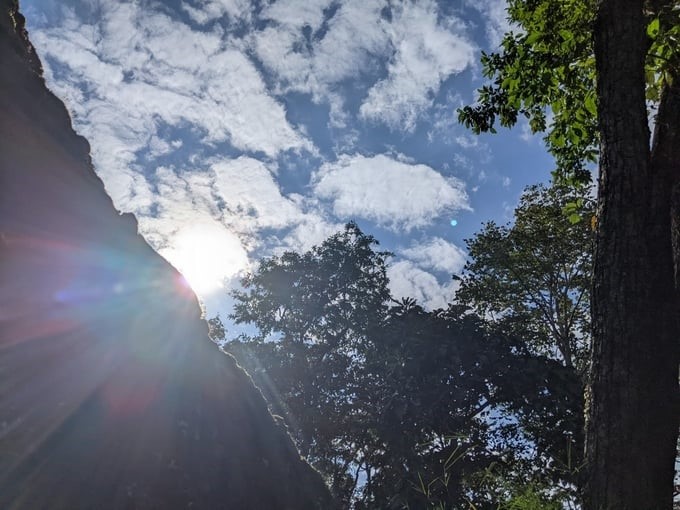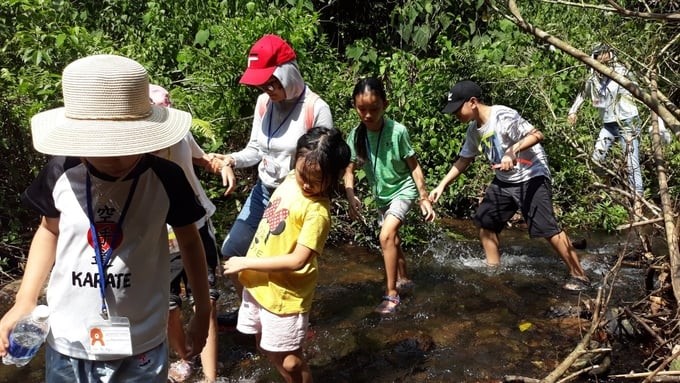May 17, 2025 | 05:22 GMT +7
May 17, 2025 | 05:22 GMT +7
Hotline: 0913.378.918
May 17, 2025 | 05:22 GMT +7
Hotline: 0913.378.918

A corner of ancient tree forest in Yok Don National Park (Dak Lak province), with a total area of 115,545 hectares and a typical dipterocarp ecosystem that is assessed to have very rich and diverse forest resources by experts. Photo: Kim Long.
To clarify this relatively new issue in Vietnam, the Department of Forestry (Ministry of Agriculture and Rural Development) said that currently, the world’s carbon market basically operates in the following two ways: international voluntary carbon markets and domestic (mandatory) carbon markets.
Accordingly, the international voluntary carbon market aims at the need to voluntarily trade carbon credits to serve the social responsibility of businesses, build public image, and create additional credit supply for the domestic carbon market.
Voluntary carbon markets are often based on bilateral or multilateral contracts and cooperation agreements between organizations, companies, or countries. Therefore, the selling price of carbon credits is regulated by the market (supply – demand).
Currently, the carbon price on the voluntary market in the world usually ranges from USD 2 to USD 4/ton of CO2, in which the average carbon price of programs or projects in Asia fluctuating over the years 2019, 2020, and 2021 was respectively USD 1.8, 1.6, and 3.09/ton of CO2. The updated average price at the present time in this market is USD 1.07/ton of CO2.
Meanwhile, the domestic carbon market (mandatory market) is regulated by a country or territory and is established and operated with the goal of implementing that country or territory's commitments to emission reduction.
Accordingly, organizations and businesses are allocated emission quotas, and if they exceed their allocated quotas, they must pay taxes or buy carbon credits. Therefore, for the domestic carbon market, the carbon selling price will depend on the country's policy regulations. There are now approximately 30 countries and territories in the world that have issued carbon taxes, with the tax rates ranging from USD 1 to USD 137/ton of CO2.
Regarding the forest carbon credit transfer agreement in Vietnam, according to the Department of Forestry, Vietnam currently does not have a mandatory market for carbon credits. Therefore, the transfer of emission reduction results is carried out through bilateral negotiations and agreements between relevant parties according to the voluntary market.
Regarding the forest carbon credit market, the Ministry of Agriculture and Rural Development has been assigned by the Prime Minister to deploy two emission reduction result transfer agreements as follows:
The first is the ERPA agreement in the North Central region, signed on October 22, 2020, between the Ministry of Agriculture and Rural Development and the World Bank (WB), the trustee of the Forest Carbon Partnership Facility (FCPF), to transfer reduced emissions of 10.3 million tons of carbon dioxide (CO2) in the North Central region in the 2018–2024 period, with a unit price of USD 5/ton of CO2, equivalent to USD 51.5 million.
About 95% of the transfer results will be transferred back to Vietnam to contribute to the national commitment to reduce greenhouse gas emissions (NDC).
However, according to the Report on Emission Reduction Results for the first period (phase 2018–2019) confirmed by the WB, the emission reduction results in the North Central region reached 16.21 million tons of CO2. Vietnam completed the transfer of 10.3 million tons of CO2 to the WB and received USD 51.5 million.
For the remaining 5.91 million tons of CO2, the World Bank has agreed to purchase an additional 1 million tons of CO2. As for the remaining credit amount of 4.91 million tons, the Ministry of Agriculture and Rural Development has reported it to the Prime Minister for consideration and decision. At the same time, continue to coordinate with the WB to measure and confirm the amount of credits for phase 2 (2020–2022). For phase 3 (2023–2024), look for partners with the need to receive transfers to conduct transfer negotiations, ensuring national interests and mobilizing additional resources for forest protection and development work in the North Central region.
The second is the ERPA agreement in the South Central region and Central Highlands. On October 31, 2021, at COP26, in the presence of Prime Minister Pham Minh Chinh, Minister of Agriculture and Rural Development Le Minh Hoan signed a Letter of Intent with the Organization for Forest Financial Enhancement (Emergent), the trustee of the Lowering Emissions by Accelerating Forest Finance (LEAF) Coalition.

Students of Hanoi capital visit and experience the ecosystem of Me Linh Station for Biodiversity, Vinh Phuc province. Photo: Kim Long.
Accordingly, Vietnam transfers to LEAF/Emergent 5.15 million tons of CO2 emissions reduction from forests in the South Central region and Central Highlands in the 2022–2026 period. LEAF/Emergent will pay for this service at the minimum price of USD 10/ton of CO2, with a total value of USD 51.5 million.
The registered area of emissions reduction commercial forest is 4.26 million ha, including 3.24 million ha of natural forest and 1.02 million ha of plantation forest.
Currently, the Ministry of Agriculture and Rural Development has completed and submitted the application for credit granting according to the TREES standard (also known as the REDD+ Environmental Excellence Standard). At the same time, the Ministry is urgently organizing technical negotiation sessions with the Emergent Organization to complete the negotiation project and report to the Prime Minister for consideration and decision.
Translated by Huyen Vu Thu

(VAN) Cold-barn systems efficiently manage environmental and temperature conditions, which aids in the prevention of respiratory diseases in pigs and protects them from the vectors that transmit African swine fevers.

(VAN) To tackle challenges, the project 'Addressing key technical bottlenecks in the grouper supply chain in Vietnam' has been underway since 2024.

(VAN) The project 'Disease-Resilient and Sustainable Cassava Production Systems in the Mekong Region', funded by the Australian Center for International Agricultural Research (ACIAR), is being implemented from 2024 to 2028.

(VAN) Data from 10,000 farming households will help professionalize production organization and support the implementation of the One Million Hectares Program for High-Quality, Low-Emission Rice Cultivation.

(VAN) FAO Director-General QU Dongyu marks International Day of Plant Health at NENA conference.

(VAN) Deputy Minister of Agriculture and Environment Hoang Trung affirmed that floriculture and ornamental plants are a growing industry that receives significant global attention.

(VAN) The three staple crops dominating modern diets – corn, rice and wheat – are familiar to Americans. However, fourth place is held by a dark horse: cassava.